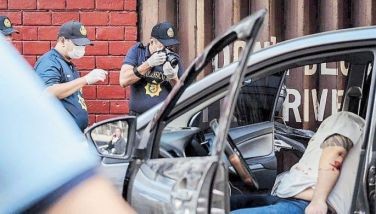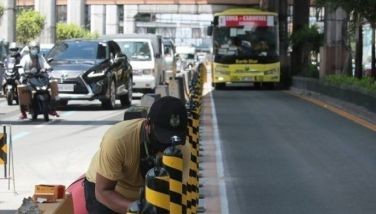Basit Usman escapes 3 days before troops' raid
MAGUINDANAO, Philippines — Elusive bomb maker Abdul Basit Usman and his four Indonesian cohorts managed to escape from a lair of the Bangsamoro Islamic Freedom Fighters (BIFF) in Sharif Saidona three days before soldiers raided the encampment last Saturday, his relatives said Wednesday.
"He was already out of the area three days before soldiers arrived to occupy the camp," said a barangay official, who is a close relative of BIFF's founder, the radical cleric Ameril Ombra Kato.
Usman's Indonesian companions, whom local community elders identified as Suharduno, Hartini, Yudyuharto and Wiranduno, were seen carrying big bags as they fled to the eastern side of the Liguasan Delta, near the first district of Maguindanao.
The bags are believed to contain materials for fabrication of improvised explosives.
The presence of Indonesian terrorists in Maguindanao and nearby Cotabato City is not a recent development.
Several Indonesian members of the Jemaah Islamiya, the Asian cell of Al-Qaeda, have been arrested in Central Mindanao from between 2003 to 2007, among them explosives experts Fathur Roman Al-Ghozi and Taufik Refke, in separate police operations during the period.
Refke and three compatriots had even managed to enroll at the Cotabato City State Polytechnic College, while they rented a house at a subdivision in San Pablo area in Cotabato City.
"Teng (Usman) and his Indonesian companions managed to escape from Sharif Saidona last March 5. When the soldiers arrived on March 7, they were already out of the area," a relative, who asked not to be identified, said in the Maguindanaon vernacular.
Usman is known as "Teng" in Maguindanao's adjoining Sharif Saidona, Sharif Aguak, Salibo, Mamasapano and Datu Piang towns.
Usman's slain cohort, Malaysian terrorist Zulkifli bin Hir alias Marwan, was popularly known in the area as "Ibz," having introduced himself to local folks as Ibrahim, Arabic for Abraham.
No Arab cohort
Barangay folks belied reports that Usman has an Arab companion from somewhere in the Middle East.
A source, who was privy to the activities of Usman, said the two Arab-looking men that acted as his aides were actually children of Moro women sired by unidentified Arab men while they worked as domestic helpers in the Middle East in the late 1980s.
"Those men are Moro, with Arab fathers. They are not foreigners because they were born in Maguindanao. They could not even speak Arabic," said an uncle of one of the two men with Middle Eastern features.
Barangay folks said Usman and Marwan had trained more than 300 Maguindanaon, Maranaw, Yakan and Tausog recruits in Mamasapano where they had stayed together from 2011 until Special Action Force commandos arrived on January 25 to neutralize them both.
Marwan was killed in the raid while a wounded Usman, an ethnic Maguindanaon, and his four Indonesian companions managed to escape even before the SAF operatives could surround the shanty where they stayed.
Sources from local peasant communities said the four Indonesians also studied how to speak the Maguindanaon dialect while in Mamasapano and two of them, Hartini and Yudyuharto, learned fast that they could already talk to people around in the vernacular long before the January 25 SAF-rebel encounters in three barangays in the municipality.
An Army captain and three enlisted soldiers were killed on Saturday in firefights with BIFF members that coddled Usman and his Indonesian companions in Sharif Saidona.
Usman first fled to the western part of the Liguasan Delta a week before the Marines took over on March 1 the BIFF's main camp in Dasikil at the border of Mamasapano and Rajah Buayan towns.
Local officials said Usman returned inland and sought refuge at a BIFF enclave in Sharif Saidona for about a week, right after talks had spread that combatants of the Philippine Marine Corps would chase him at the marsh.
The Marines had killed four bandits, Jack Norodin, Kaharudin Pendatu, Tahir Sapal, and Murad Duwang, as they marched through BIFF defense lines encircling the camp, where Commander Mohammad Ali Tambako and his men had assembled improvised explosives used in recent attacks in Central Mindanao.
- Latest
- Trending































